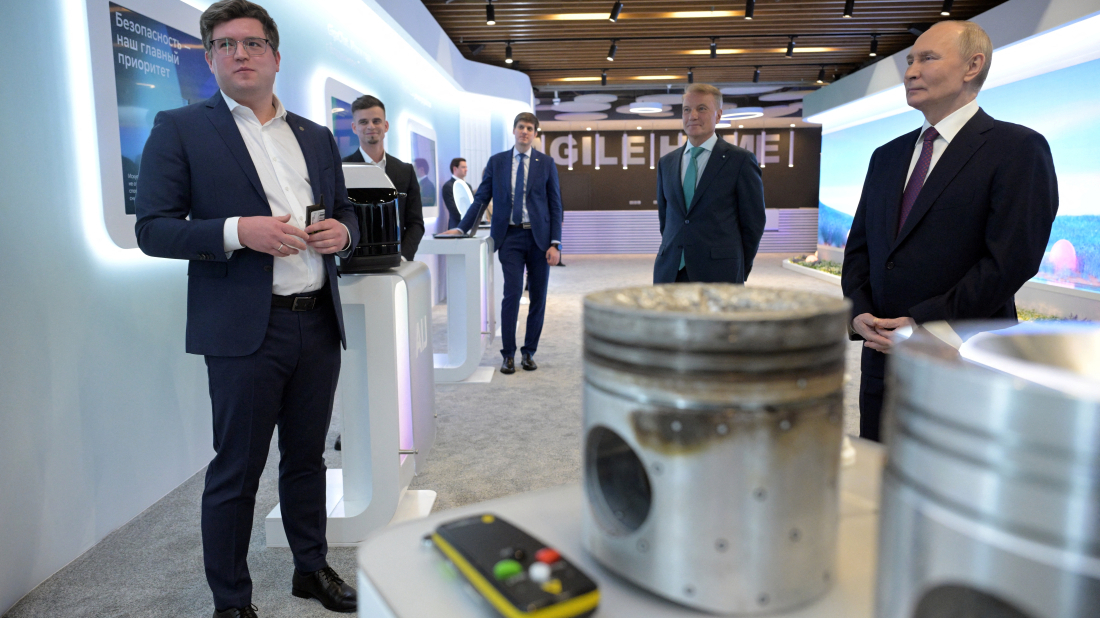Georgia strengthens Armenia ties to secure transit role and support South Caucasus connectivity
Georgia is increasing its focus on regional connectivity and infrastructure cooperation with Armenia, as competition over new transport routes and cha...
President Putin announced Russia's AI Alliance Network with BRICS nations and other partners, aiming to challenge U.S. dominance in AI. This collaboration seeks to advance research, regulation, and market opportunities in the AI sector.
President Vladimir Putin said on Wednesday that Russia would develop artificial intelligence with BRICS partners and other countries, in a bid to challenge the dominance of the United States in one of the most promising and crucial technologies of the 21st century.
Speaking at Russia's flagship AI conference, Putin said the new AI Alliance Network would include national associations and development institutions in the field of AI from BRICS countries and other interested states.
"Russia must participate on equal terms in the global race to create strong artificial intelligence. It is precisely the advanced solutions that Russian scientists are currently working on," Putin told an AI conference in Moscow.
"We invite scientists from all over the world to join in the collaboration," he added.

Western sanctions intended to restrict Russia's access to the technologies it needs to sustain its war against Ukraine have resulted in the world's major producers of microchips halting exports to Russia, sorely limiting its AI ambitions.
Russia's dominant lender Sberbank is spearheading AI development in Russia, but Sberbank CEO German Gref acknowledged in 2023 that graphics processing units (GPUs), the microchips that underpin AI development, were the trickiest hardware for Russia to replace.
On Wednesday, the bank said national AI associations from BRICS members Brazil, China, India and South Africa, but also from Serbia, Indonesia and other non-BRICS countries, had joined the AI Alliance Network.
It said the network would facilitate joint research into technology and AI regulation, and provide opportunities for AI products to be sold in member countries' markets.
RUSSIA SEEKS TO JOIN LEADING POWERS IN RACE FOR AI SUPREMACY
The United States and China are the world's top AI powers, and U.S. President-elect Donald Trump has named a "White House AI and Crypto Czar" to help ensure the United States remains the richest and most technologically advanced power in the world.
But Putin's move to ally with China could change the dynamics of the AI race.
Russia is one of 10 countries, including the U.S., China, Britain and Israel, that are developing their own generative AI models. The Yakov and Partners consultancy, run by former McKinsey employees in Moscow, says this gives it the potential to become a much more significant player.
Russia sees the use of AI technologies across all sectors adding 11.2 trillion roubles ($109 billion) to gross domestic product in 2030, compared to 0.2 trillion roubles ($1.9 billion) in 2023.
Its AI strategy also says that 80% of all Russian workers should have AI skills by 2030, compared with 5% in 2023, while AI investment should grow seven-fold to 850 billion roubles.
Sberbank, which has developed a generative AI model called GigaChat, and technology leader Yandex, with its YandexGPT model, dominate Russia's domestic AI market.
Russia currently ranks 31st of 83 countries by AI implementation, innovation and investment on UK-based Tortoise Media's Global AI Index, well behind not only the United States and China but also fellow BRICS members India and Brazil.
Stanford University's AI vibrancy tool, which evaluates 36 countries based on 42 AI indicators including research and development, ranks Russia 29th.
A seven-month-old Japanese macaque has drawn international attention after forming an unusual bond with a stuffed orangutan toy after being rejected by its mother.
Divers have recovered the bodies of seven Chinese tourists and a Russian driver after their minibus broke through the ice of on Lake Baikal in Russia, authorities said.
Pakistan said it carried out cross-border strikes on militant targets inside Afghanistan after blaming a series of recent suicide bombings, including attacks during the holy month of Ramadan, on fighters it said were operating from Afghan territory.
Italy said a fond farewell to the Winter Olympics on Sunday with an open-air ceremony in the ancient Verona Arena that celebrated art and sporting achievement at a Games lauded as a model for how to stage such events.
Ukraine’s President Volodymyr Zelenskyy has approved new sanctions targeting Russian maritime operators, defence-linked companies and individuals connected to Moscow’s military and energy sectors, according to official decrees issued on Saturday.
The United Nations mission in Afghanistan said on Monday it had received “credible reports” that at least 13 civilians were killed and seven others injured in overnight Pakistani airstrikes inside Afghanistan.
The former British ambassador to the U.S. Peter Mandelson has been arrested by police in London on suspicion of misconduct in public office.
At least 25 members of Mexico's National Guard have died during a wave of violence in the state of Jalisco after the killing of a drug lord, the country's security minister has said.
The European Parliament on Monday (23 February) postponed a vote on the EU’s trade deal with the U.S. after President Donald Trump imposed a blanket 15% import duty.
The U.S. Supreme Court has overturned key elements of President Donald Trump’s global tariff policy, creating uncertainty ahead of his March meeting with China’s Xi Jinping. The ruling raises fresh questions about the future of U.S.-China trade relations and the stability of the global economy.
You can download the AnewZ application from Play Store and the App Store.

What is your opinion on this topic?
Leave the first comment